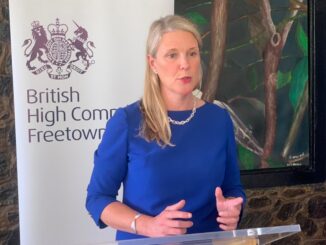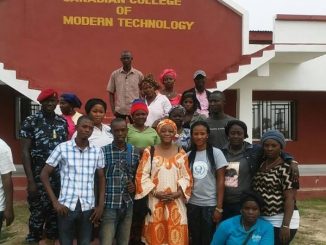
THE MILLENNIUM CHALLENGE CORPORATION (MCC): How Sierra Leone Attained Proposed Compact Eligibility and the Fear of Suspension and/or Termination from the Program
Yes indeed. upon passing the Millennium Challenge Corporation (MCC) scorecard in FY2020, “Sierra Leone Proposed Compact | Millennium Challenge Corporation”eligibility announcement came as a welcome news to attentive Sierra Leoneans despite the country’s polarized political disposition.

And if upheld to the letter and to the satisfaction of the MCC Board of Directors the people of this once war-torn small West African nation could attract hundreds of millions of United States’ dollars from the Millennium Challenge Account (MCA) Assistant funds to fast-tract the rebuilding of its mostly derelict infrastructure.
It’s however worth noting that “Sierra Leone Threshold Program | Millennium Challenge Corporation” in 2015 attracted USD 44.4m earmarked for energy and pipe borne water improvement projects. “U.S. and Sierra Leone Sign First-Ever $44 Million MCC Agreement | Millennium Challenge Corporation”
President Julius Maada Bio ascended timely at the helm of affairs in the country to take credit for the Proposed Compact development eligibility on behalf of the people of Sierra Leone, whose resolve to fight corruption between 2015-2020 made it possible. https://www.mcc.gov/…/pro…/sierra-leone-proposed-compact
“In December 2020, the MCC Board of Directors selected Sierra Leone as eligible to develop a compact,” the announcement reads. This feat was achieved for the most part due to the .12 points increment from .46 to .58 on the scorecard for the Control of Corruption indicator.
Nonetheless, at a close look at the scorecard FY2020 https://www.mcc.gov/who-we-select/scorecard/fy-2020/SL, and out of the twenty (20) performance indicators assessed in the categories of Economic Freedom, Ruling Justly and Investing in People, except for six; Trade Policy 2019, Gender in the Economy 2019, Land Right and Access Improvement 2020, Access to Credit 2020, Business Start-up 2020 and Freedom of Information 2019, all of the remaining fourteen (14) performance indicators were based on assessment of Sierra Leone from 2015-2018.
Also, none of the indicators, which assessment’s ran into 2019 and 2020 made positive impact on the scorecard in the assessment period save for Gender in the Economy indicator. Rather, many of the performance indicators took a nosedive in 2019 and 2020.
It means that, Sierra Leone’s assessment was for the most part based on activities ranging from 2014 before the Threshold to activities in 2015 to 2018 under the Threshold program.
ECONOMIC FREEDOM:
Sierra Leone’s scorecard registered a slight upward improvement in The Fiscal Policy indicator in 2016, plunged in 2017 and 2018, and increased slightly again in 2019, but remained below the median of -3.4 at -5.7. Inflation was in check for the most part of 2014 mainly because of iron ore mining. In 2015 due to the Ebola epidemic and the global iron ore price bubble burst, Inflation ranked at 13%, at two (2) points below the median, in 2018.
Regulatory Quality moved up slightly in 2015 and remained stagnated at -0.10 below the 0.00 median. Trade Policy remained improved from 2016 to 2019 mainly due to the Ernest Bai Koroma One-Stop-Shop business start-up policy and took a nosedive in 2019.
Gender in the Economy stayed in positive figures in 2018 and 2019 and increased sharply in 2020 mainly due to President Maada Bio’s scaled-up appointment of women in public service slightly above the Ernest Bai Koroma era.
Land Right and Access performed badly throughout the assessment period mainly because of the archaic land tenure system compounded by the minister of lands’ uncanny and unprofessional approach to land dispute and distribution under the Maada Bio administration in 2018, 2019 and 2020.
Access to Credit saw no improvement throughout the assessment period mainly because of the uncontrolled cutthroat lending interest rate and predatory lending practices amongst commercial banks. Business Start-Up indicator increased in 2017 and remain unchanged throughout 2020 mainly due to the same good business start-up policy referenced above.
RULING JUSTLY:
Political Rights ranked 92% in 2014 throughout 2018. Civil Liberties increased steadily from 2014 to 2017 and took a plunge in 2018. This is mostly blamed on police brutality, post-election political violence, vindictive and state-sponsored violence against opposition politicians. https://m.facebook.com/watch/?v=606853453153557&_rdr
Control of Corruption improved in 2017 and 2018 partly due to Ernest Bai Koroma’’s Anti-Corruption Commission’s initiative such as Pay-No-Bribe https://www.mcc.gov/…/video-120916-sierra-leone-pay-no… and the proper implementation of some aspects of the MCC Threshold program such as “Mapping Freetown’s Water Pipes to Improve Service Delivery”.
While Government Effectiveness remained in steady negative figures up to 2018, The Rule of Law steadily increased up to 2018 as Freedom of Information remained stagnated in positive figures up to 2019. Despite the insidious repression of freedom of expression and the press,
Freedom of Information indicator may have been buffered by the repeal of the seditious libel and slander section of the Public Order Act of 1965 by the Bio administration in 2020. (Note; extra ordinary improvements were given consideration in the report before it was submitted to Congress in 2020).
INVESTING IN PEOPLE:
Health Expenditure increased in 2014, 2015 and 2016 to maintenance the Ernest Bai Koroma free healthcare for children under five, pregnant women and lactating mothers. Despite the free primary school education under the Ernest Koroma administration, Primary School Education Expenditures showed marked improvement. But unlike the positive impact before 2018 on education, the all-encompassing free quality education for primary and secondary schools under the Bio administration made very little or no impact on the quality of education.
This is marked by the mass public exams failure in the country last year. Many parents who are being charged extra fees over and above the regular school fees charged even before the free quality education, are less than enthusiastic about the free quality education policy.
Natural Resources showed no improvement over the assessment period, Immunization Rates improved in 2016 and remained unchanged at point 1.5 below the median for countries in this category. Girls Primary Education increased drastically from 2016, 2017 and 2018.
Child Health improved steadily from 2015 to 2018 but remained below the median by 2.4 points mainly due to the free health care program under the Ernest Bai Koroma administration between 2007-2018.
The above analysis indicates that the large portion of the works deployed in the process of achieving the MCC Proposed Compact development program, which was mainly due to the passing of Control of Corruption, was achieved between 2014 and 2018. Notably, the gains made in the Control of Corruption indicator are visibly highlighted on the MCC website in the areas of the Threshold agreement implementation and the Pay-No-Bribe project between 2015 and 2018. (See links above).
Ironically though, in spite of all the hue and cry at former All Peoples Congress (APC) government officials for graft, it seems that the SLPP government’s Anti-Corruption Commission (ACC) has much more work at hand in the Control of Corruption indicator way over and beyond the ACC boss’ fixation on past corruption.
“The Board looks at three legislatively-mandated factors when it evaluates any candidate country for compact eligibility: (1) policy performance; (2) the opportunity to reduce poverty and generate economic growth; and (3) the availability of MCC funds,” as stated on the MCC website.
But it seems the country, in the last two and half years, has been pretty inconsistent with the MCC set criteria. And the country could be suspended or terminated from achieving compact program because of the following amongst many set MCC criteria:
• A decline in performance on the indicators used to determine eligibility;
• A decline in performance not yet reflected in the indicators used to determine eligibility; or
• Actions by the country which are determined to be contrary to sound performance in the areas assessed for eligibility for Assistance, and which together evidence an overall decline in the country’s commitment to the eligibility criteria.
By the look of things, suspension and or termination from the program are ominous on the horizon, and the question on the minds of enlightened and attentive Sierra Leoneans to the MCC Proposed Compact program today:
Will their present leaders be able to earnest and rise up above the MCC proposed compact agreement with the US Government to attract the much needed MCA Assistant funds?
The Author:
Karamoh Kabba is a social and political analyst. He is the author of several published works. He lives in Freetown, Sierra Leone.



